‘Parliament building inaccessible to me,’ MP says
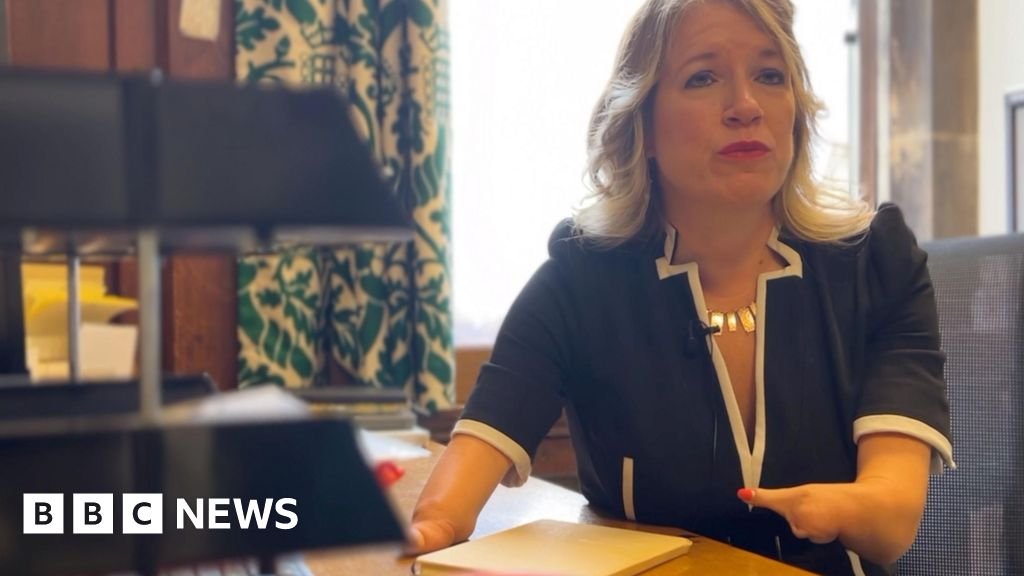
Marie Tidball MP says she is joking when she threatens to chain herself to a Parliament door handle. But I am not entirely sure I believe her.
Tidball was born with a congenital disability, which affects all four limbs. She has foreshortened arms and legs, with one digit on each hand.
When she was a child she missed three years of school because of the critical surgeries she needed.
The disability campaigner was elected as Labour MP for Penistone and Stocksbridge in South Yorkshire last July, and says that while getting into politics is difficult, getting around the Houses of Parliament is hard when you have a disability.
As MPs return to Parliament following the summer recess, I took a tour around the building with her.
It is not long before we reach a heavy wooden door with one of the round, smooth door handles.
“Within about five months of being here, I had about six conversations with senior people about door handles,” she tells me.
“And I said if I have to have another conversation about why we need to make the door handles more accessible I will chain myself to them – rather irreverently I might say.”
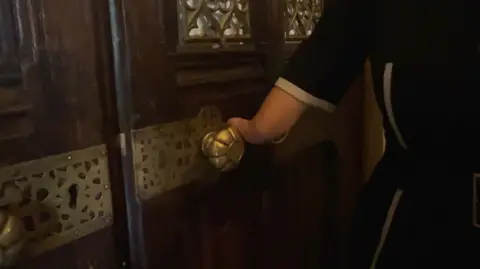 BBC/James Vincent
BBC/James VincentA Parliament spokesperson says work is taking place to upgrade access for disabled people and the House of Commons Modernisation Committee is currently looking at how to improve things.
But Tidball says there is a long way to go.
“Twenty-two per cent of the voting age population are disabled,” she says.
“We absolutely need to make sure that the composition of Parliament reflects those numbers. It makes our politics much more rich.”
As we go up and down sets of stairs and in and out of doors, we talk about how far away the accessible toilets are from some of the committee rooms.
And when you get there, you have to push open a heavy door to get into them.
I ask Tidball if any of this makes her angry.
“It does make me angry but you know what they say – don’t get angry, get organised,” she says, smiling.
“Ultimately I want to make this place more inclusive for other disabled people who might come through the doors.”
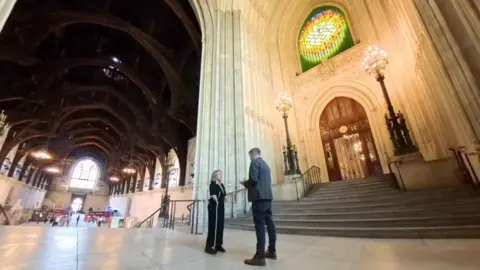 BBC/James Vincent
BBC/James VincentAs our footsteps echo across the stone floor tiles and the courtyards of Parliament, I notice we have already done a fair chunk of our recommended 10,000 daily steps.
Walking through the buildings is a good way to bump into fellow MPs but you can cover a fair distance.
Tidball wants to show me a change that has already been made in the newer Portcullis House – an accessible door.
I joke that perhaps it should have a plaque with her name on outside and Tidball laughs as she says it might be a part of her legacy.
She is among several disabled MPs who have given evidence to the Modernisation Committee about accessibility.
A number reported challenges including concerns about dark spaces in the historic Palace of Westminster, a lack of accessible toilet facilities and unclear signage.
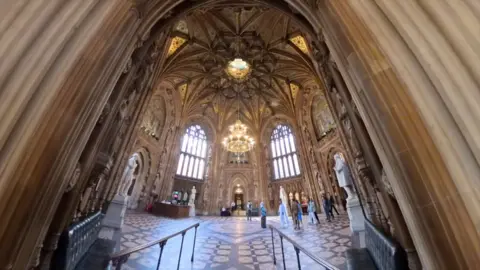 BBC/James Vincent
BBC/James VincentWe have been given special permission to walk around certain areas of the Houses of Parliament with Tidball. The scale of the buildings is not often seen by the public.
As a political editor, I am supposed to be used to all the statues, vaulted ceilings, and, to be frank, posh surroundings.
But I’m not.
It instantly strikes me as an amazing slice of history but a very difficult place to navigate if you do not necessarily feel welcome.
When we get to Central Lobby we are being looked down upon by statues of former prime ministers as we chat. This is Parliament’s meeting place.
Members of the Commons and Lords mingle here and technically you can turn up here as a member of the public and ask to see your MP, although you are encouraged to make an appointment.
That is of course, if you feel like you can.
Fifteen years ago, the government passed the Equalities Act in these buildings.
The duty to make it easier for disabled people to access public spaces was made law in the room right next to where we are stood.
The irony is that room, the Commons Chamber, is still inaccessible to many.
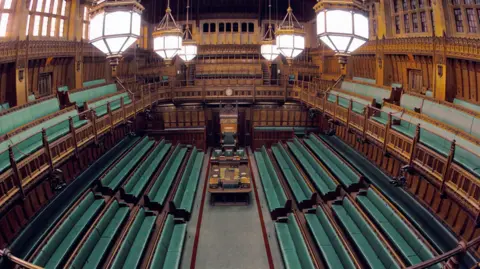
These buildings are not easy to modernise.
But it is not just the fixtures and fittings that need to be looked at. The archaic ways of Parliament, that some people love, can create barriers for disabled MPs.
To get the Speaker’s attention during a debate, MPs stand up and sit down, pretty much constantly, to grab his eye.
“Sitting on those green benches is really special, but they were designed for tall men so for me it is a bit of struggle,” Tidball says.
She adds that although she feels “incredibly lucky” to be in Parliament, there are other physical challenges to the job.
When MPs vote they walk through voting lobbies – either the Aye or the No lobby.
“Its a long old walk, it takes about 15 minutes per vote,” Tidball says.
“We’ve done 10 votes in a day before. ”
‘Changes are needed’
Tidball wants everyone to feel like they could become an MP and hopes that Parliament can reflect society
In terms of it being welcoming for everyone, however, I ask her if it is good enough.
“It’s not good enough. That is why we’ll continue to work hard to make it better,” she says.
“I think we’ve got the will there to make those changes.”
“That culture has already changed and the staff have been incredible.
“While I have the privilege of being here, I’ve got to do what I can to make it easier for the next generation of disabled young people – to make them feel that this space is for them.
“I also want to make sure that constituents, regardless of whether they’ve got disabilities or not, feel that this is their house too.”
The House of Commons Modernisation Committee is currently looking at how to improve things.
An accessible toilet has been installed near the Commons Chamber, as well as improved signage and lighting.
A report is due to be published later in the year with plans for bigger changes.
Lucy Powell, Leader of the House of Commons and Chair of the Modernisation Committee, said: “The House of Commons must set an example on accessibility, yet we’re repeatedly falling short of what we expect from every other employer in the country.
“No-one can have listened to the evidence we’ve heard over the past months and not feel compelled to act.”
She said it is “unacceptable” that the role of an MP is made harder by the structure of the building and by inaccessible procedures and processes.
“Our inquiry is ongoing, and we’ll be setting out a whole host of ambitious recommendations in the autumn, but with these quick and important actions we make this a more workable and welcoming place to all those who use it,” she said.
A Parliament spokesperson said: “It is vital that Parliament is accessible to all.
“We understand that there is more to be done to ensure that disabled people do not face unnecessary difficulties when working in or visiting Parliament.”
They said Parliament is “committed to making further essential adjustments”.
“In the meantime, we are getting on with work across the estate to ensure the safety of our colleagues and visitors, as well as supporting the continued business of Parliament,” they said.
Discover more from News Hub
Subscribe to get the latest posts sent to your email.







